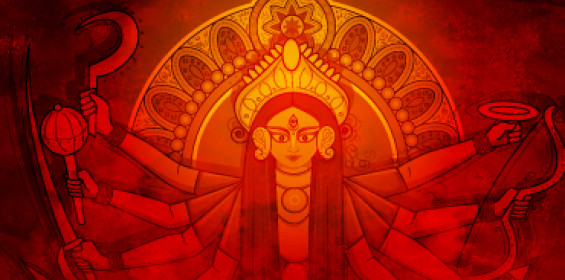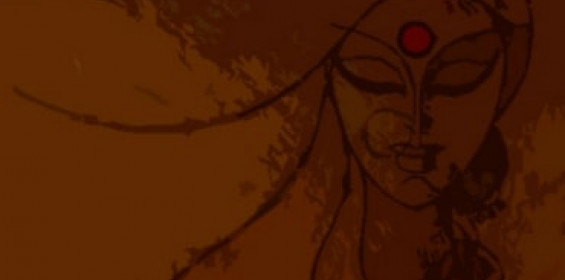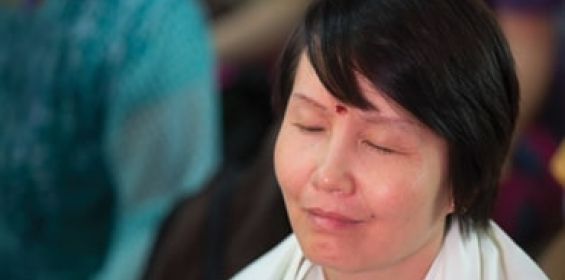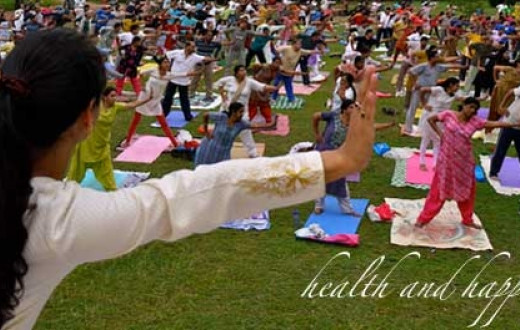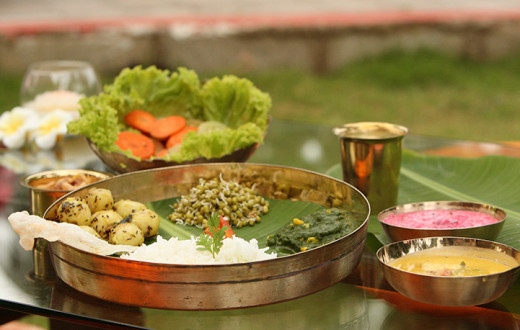Mero mukh niko, ki tero radha pyari?
Darpan hath liye nand nandana, saachi kaho vrishbhanu - dulari
Hum se kaho, tum hi kyon na dekho, hum gauri tum shyam bihari,
Mero mukh jaiso chanda ujiyaro, tumro mukh jaise rain andhiyari,
Tero nayanan mein moto- moto kajra, humare nayan mein tum banvari,
Tum toh nakh par girivar dharyo, hum ur dhari rahe girdhari,
Sur shyam ya chavi ki shobha, en nayanan so tarat na tari
The above verse is in Braj Bhasha, a parent of the Hindi language as it is spoken today and is the language of many lyrical poems on Krishna. Here is the meaning of the verse in English:
Krishna looking at a mirror in his hand, asks Radha, ‘between the two of us, whose face is better?’ Radha, the devotee replies, ‘Don’t you see the obvious?! My face is like the full moon and yours is like the dark night (both complement each other as the moon cannot be seen without the night sky and the night sky is so vacant without the moon!).’
Radha continues, ‘Your eyes are beautifully defined by black Kajal, while my eyes are pretty because your image reflects in my eyes. Also, you only lifted the Govardhan hill on your little fingernail, but I carry you, the lifter of Govardhan in my heart!’ Surdas says, ‘I cannot forget this divine image of the two, the divine and devotee as one.’
The beautiful verse is composed by the 16th-century devotional poet, Surdas who composed and sang songs about Lord Krishna. Surdas was visually-impaired. Most of his verses have become part of the popular oral tradition in North India, particularly Braj Bhumi, the geographic area where Krishna spent his childhood.
Surdas’s story
The beautiful songs of Surdas are a window to his soul. He loved Lord Krishna dearly and wanted nothing but his union. Born in 1478 CE, he was often neglected at home because of his visual impairment. He developed an affinity for music while listening to groups of singers that passed by his house.
At the age of 6, he left home and wandered away with a group of singers. However, they soon left him alone. Yet, the young boy managed to survive and started composing poems and songs.

According to a legend, once Surdas dreamt of Lord Krishna calling him to Braj Bhumi, after which his life changed. He met his guru Shri Vallabhacharya who asked him to dedicate his life to Lord Krishna.
Thereafter, Surdas stayed in Braj Bhumi for the rest of his life and composed thousands of Krishna bhajans. Even when he was invited to places outside of this Braj Bhumi area, Surdas refused such invitations and stayed back.
Soon, he became famous for his compositions. Even emperor Akbar paid homage to him.
A divine vision
Every evening, Surdas composed a bhajan upon visiting the Krishna temple. Every day, the composition included phrases that correctly described the alankaram (attire) of the Krishan murti (deity). The onlookers and priests inevitably were taken by surprise. ‘How is he able to describe the Lord’s attire despite being blind?’ they thought.
The priests thought that perhaps Surdas is just guessing the adornments of the deity. So, they thought of doing a test: they did not adorn the deity with any attire a particular evening. When Surdas sat in the temple for bhajan, he surprised everyone again by a composition eulogizing the natural color of Krishna (meghashyama meaning dark clouds) sans the adornment. That day, everyone realized that even though Surdas was blind, he was endowed with a divine vision that enabled him to see the Divine in all his splendor.Surdas, a poet from the Bhakti tradition
Surdas was among those saints in that era who preferred devotion and love over ritualistic worship as a means to connect with the Divine. As an expression of love for the Divine, many composed poems and songs which are still popular today.
Saints of the Bhakti tradition often immortalized the love between Radha and Krishna through songs. The message that even the cosmic soul longs to unite with individual souls, grew to form the foundation of the Bhakti movement. The poets of the Bhakti tradition used the word Radha to express and bring forth their bhakti, universal love for Krishna.
Surdas was a disciple of Shri Vallabhacharya who popularized the belief that even householders could achieve salvation, the kind that was assumed to be only limited to ascetics. However, Surdas composed devotional songs even before he met his guru.
His songs often talk about the love between Lord Krishna and Radha, and Lord Krishna’s playful acts as a child. He also sang praises for Lord Krishna and about the love he had for him.
Most songs of Surdas, like the one written at the beginning of this article, are about stories of Lord Krishna’s life. Ripe with vivid imagery, the verses will awe you and bring a smile to your face.
One of his most popular songs describes an incident when Krishna playfully tells Mother Yashoda that he is innocent every time she accuses him of stealing butter. The song, Maiya Mori Mein Nahi Maakhan Khayo (My mother, I did not eat the butter) has been rendered several times by popular singers and is one of the favorite bhajans of Krishna devotees.
Yet, in another song, Surdas sincerely requests Krishna to erase imperfections (negative thoughts) from his mind. He goes on to say that Lord Krishna is equanimity and requests him to take him under his shelter.
Irrespective of their tonality, Surdas’s compositions will evoke the same love and warmth in you with which they were originally composed.
The material has been sourced from @bharathgyan. This research team, led by a passionate husband-wife duo - Dr. DK Hari and Dr. Hema Hari, unearth some of India’s untold stories and make them contemporary. You can click here to buy any of their books on Indian civilization.

